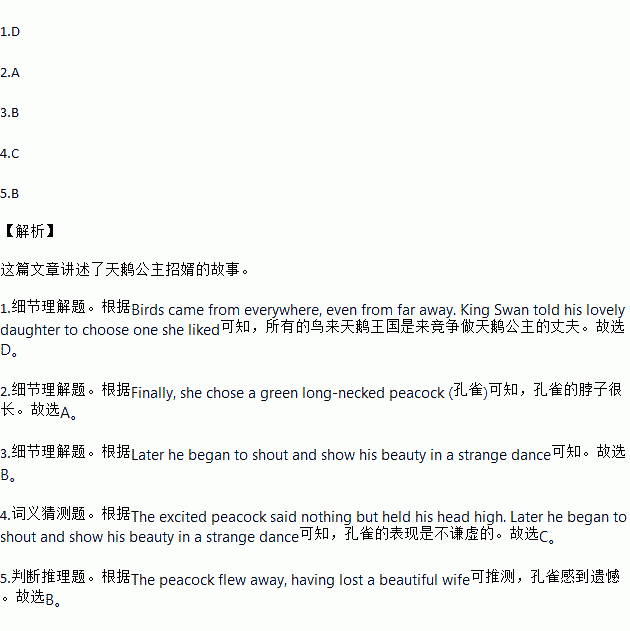题目内容
Long long ago, King Swan (天鹅国王) had a beautiful daughter. On her 15th birthday, she wished that when she was old enough, she could choose her own husband. King Swan agreed with her.
When the princess was old enough, King Swan called all the birds to his home. Birds came from everywhere, even from far away. King Swan told his lovely daughter to choose one she liked. She looked over the many birds. Finally, she chose a green long-necked peacock (孔雀). She told her father, "This bird, the peacock, will be my husband."
Hearing that the peacock was the lucky one, all the other birds crowded around to congratulate (祝贺) him. The excited peacock said nothing but held his head high. Later he began to shout and show his beauty in a strange dance. The other birds started to laugh.
King Swan was angry. Standing in the middle of the birds, he said, "Sir Peacock, your voice is sweet, and you’re really very pretty. But you are not modest at all. I will not allow my daughter to marry you!"
The princess also learned she was wrong. Then King Swan married his daughter to a modest bird. The peacock flew away, having lost a beautiful wife.
1.All the birds went to King Swan’s home to _______.
A. ask him for help B. celebrate his birthday
C. enjoy the princess’s dance D. compete for the princess’s husband
2.What can we know about the peacock?
A. His neck was long. B. His eyes were beautiful.
C. He and King Swan were friends. D. He always played with the princess.
3.The peacock was so excited that he _______.
A. jumped and shouted B. shouted and danced
C. jumped and sang D. sang and danced
4.What does the underlined word "modest" in Paragraph 4 mean in Chinese?
A. 诚实的 B. 仁义的 C. 谦虚的 D. 勇敢的
5.At the end of the story, the peacock must feel _______.
A. lucky B. sorry C. worried D. relaxed
 天天向上一本好卷系列答案
天天向上一本好卷系列答案 小学生10分钟应用题系列答案
小学生10分钟应用题系列答案

 B.
B.  C.
C. 